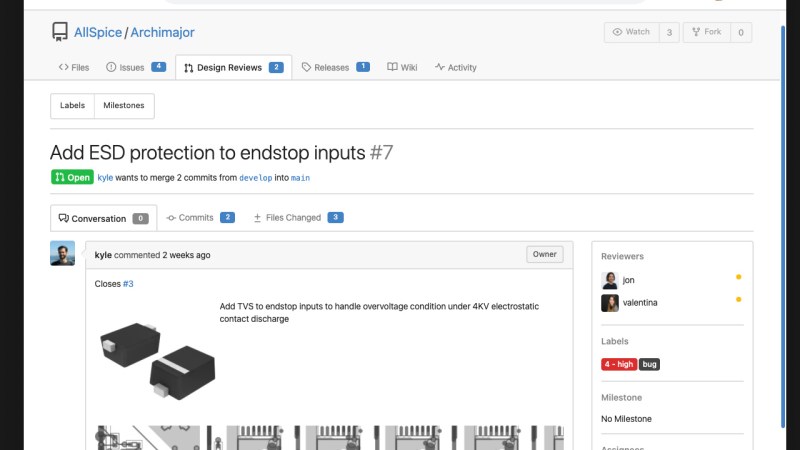In our “hardware development gets serious” news, we’ve recently learned about AllSpice, a startup building hardware development collaboration infrastructure for companies. Hardware developers are great at building hardware tools for themselves, but perhaps not always so when it comes to software, and AllSpice aims to fill that gap at the “hardware company” level. Nowadays, what commonly happens is that software development tools and integrations are repurposed for hardware needs, and the results aren’t always as stellar as they get in the software world. In other words, AllSpice is learning from the positive outcomes of software industry and building a platform that takes the best parts from these tools, aiming to get to similarly positive outcomes in areas where currently hardware team experiences are lacking.
What AllSpice is building seems to be an umbrella platform designed to augment, integrate and hook into a slew of different already-developed platforms like GitHub, GitLab, Jira (and some other ones), and add much-needed features that large-scale hardware developers can’t afford to maintain and develop themselves. “Design review by screenshot” isn’t unheard of in hardware circles, and likely a thing that everyone of us with hardware collaboration experience has partaken in. On a company scale, there’s a myriad of hardware-related problems like that to solve and polish over.
When trying to scale your project into a product, you might eventually find yourself in a team of people all working on the same hardware project. In collaboration like that, there’s a simple principle – you need to have tools that improve communication among all the people involved, and having a platform that’s hardware-tailored is paramount for that, especially when your product grows into a slew of different revisions and SKUs. Just like GitHub has integrations for compiling and testing your code when someone sends you a pull request, the tools we use for collaborative hardware development should keep track of our BOM, PCB and schematic changes in a developer-friendly way. If this project doesn’t grow into a platform that us mere mortal hackers can use, we shall hope it at least it becomes influential enough to positively influence the tools we currently use for our hardware collaboration needs.
We cover collaboratively developed products every now and then, and there was even a “developed on Hackaday” series at some point! An ever-popular example of collaborative design project are conference badges, each one typically a fruit of many people’s labor. Talking about the “growing into a product” aspects, an unexpected number of us hackers make a living from that, either through selling on Tindie or through otherwise going big with our products.
What are your hardware collaboration experiences? Any pain points you have discovered the hard way, either as a hobbyist or as an engineer?
Thanks to [Flagg] for sharing this with us!

















When I looked at this last (month? Weeks?) there was no support for Eagle or KiCAD files. It’s very corporate i.e. Altium oriented. They do publish their visual PCB diff tool which integrates with a git backend as open source software.
“Hardware developers are great at building hardware tools for themselves, but perhaps not always so when it comes to software”
It seems you’ve swapped the words “hardware” and “software” here.
“It seems you’ve swapped the words “hardware” and “software” here.” He he….
It seems inconsistent to me with the rest of the paragraph’s points.
I’m not totally seeing the problem that Allspice solves.
What is the new way that it helps with hardware design?
“When trying to scale your project into a product, you might eventually find yourself in a team of people all working on the same hardware project. In collaboration like that, there’s a simple principle – you need to have tools that improve communication among all the people involved, and having a platform that’s hardware-tailored is paramount for that, especially when your product grows into a slew of different revisions and SKUs.
Just like GitHub has integrations for compiling and testing your code when someone sends you a pull request, the tools we use for collaborative hardware development should keep track of our BOM, PCB and schematic changes in a developer-friendly way. If this project doesn’t grow into a platform that us mere mortal hackers can use, we shall hope it at least it becomes influential enough to positively influence the tools we currently use for our hardware collaboration needs.”
Is this intended to help developers that don’t have an ECR / ECN process to release documentation to production?
I would be really nice to be able to take a schematic pull request and do automated CI on it to run a SPICE simulation and check that various parameters are still in spec (essentially unit tests). Unfortunately, for any real project involving microcontrollers and other digital devices, the existing hardware/software co-design/simulation tools that are out there really suck. Using SystemC was a journey through hell.
I really have to hand it to the LibreSoC people for trying to sheer this yack, if only part of the larger problem.